Tra i mestieri napoletani di un tempo o‘ Gliuommenaro raggiunse il suo apice nel trecento e nel quattrocento.
‘O Gliuommenaro, ma chi era costui? Si tratta di uno dei più antichi mestieri praticati nel capoluogo campano. Sono in pochi a ricordarlo anche perchè, attualmente, nessuno ne ha mai sentito parlare o non conosce neanche il significato di questo termine, invece, molto comune ai nostri bisnonni. Scopriamo dunque di chi stiamo parlando. I mestieri napoletani di un tempo sono moto numerosi e tra questi ce n’è uno che solo in pochi conoscono, vale a dire ‘O Gliuommenaro, un mestiere assai diffuso e molto prestigioso in passato che ha contribuito notevolmente a far conoscere ed apprezzare la nostra città nel mondo, nel corso dei secoli. ‘O Gliuommenaro, termine difficile pure a pronunciare ed a scrivere, più che un mestiere, rappresentava una vera vocazione. Coloro i quali si cimentavano in quest’attività non erano persone comuni, bensì degli artisti che solitamente suonavano uno strumento musicale, recitando per strada delle loro poesie in cambio di qualche soldo.
Among the Neapolitan crafts of the past, o’ Gliuommenaro reached its peak in the fourteenth and fifteenth centuries.
‘O Gliuommenaro, who was he? It is one of the oldest crafts practiced in the Campania capital. Few people even remember it because, at present, no one has ever heard of it or does not even know the meaning of this term, however, very common to our great-grandparents. So let’s find out who we’re talking about. The Neapolitan crafts of the past are numerous and among these there is one that only few know, namely ‘O Gliuommenaro, a very widespread and very prestigious profession in the past that has contributed greatly to make known and appreciate our cities in the world, over the centuries. ‘O Gliuommenaro, a difficult term to pronounce and to write, more than a trade, represented a true vocation. Those who ventured into this activity were not ordinary people, but of the artists who usually played a musical instrument, reciting their poems in the street in exchange for some money.
Clicca quì per continuare a leggere l’articolo.
Click here to continue reading the article.

